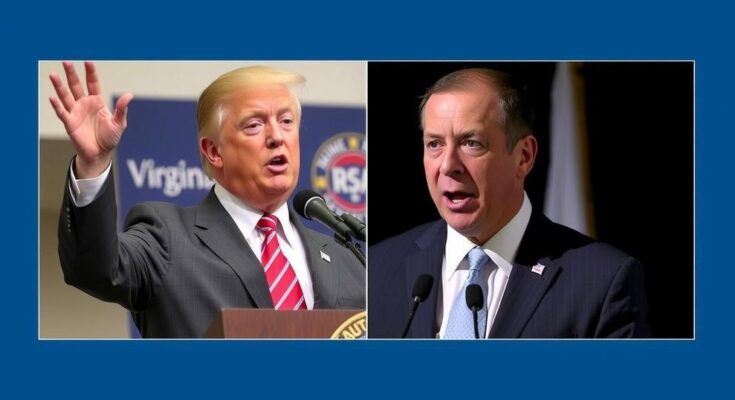Virginia’s special elections on Tuesday will indicate voter sentiment before the 2025 gubernatorial race, with key races in districts indicating potential shifts between Democratic and Republican control. Reproductive rights and budget allocation priorities are central themes, impacting key candidates as they vie for significant seats in the General Assembly.
The special elections taking place in Virginia on Tuesday serve as a preliminary gauge of political sentiment ahead of the gubernatorial race in 2025. As Republicans appear poised for significant national influence, these elections could either affirm the Democratic majority in the state legislature or suggest a shift toward Republican advantage. Candidates include Democratic Delegate Kannan Srinivasan, aiming to retain her seat against Republican Tumay Harding in the 32nd Senate District, and Democrat J.J. Singh, competing with Republican Ram Venkatachalam for a House District seat previously held by Srinivasan. National attention has focused on these contests, underscored by substantial investments from the Democratic Legislative Campaign Committee.
In the Republican-leaning 10th Senate District, Democrat Jack Trammell and GOP nominee Luther Cifers are contending to fill former state Senator John McGuire’s position. Cifers starts as the favorite, as the district has shown notable support for President-elect Donald Trump and Governor Glenn Youngkin in previous elections. Concurrently, Virginia lawmakers are faced with a $2 billion budget surplus, prompting discussions around funding allocation, with Democrats favoring K-12 education while both parties eye potential tax relief measures.
Reproductive rights have surfaced as a pivotal issue in these elections. Candidates Srinivasan and Singh have expressed commitments to defending abortion access, while Venkatachalam’s stance remains ambiguous. Harding asserts that she supports life from conception, denoting that late-term abortions are largely prohibited. In the 10th District, Trammell advocates for constitutional protections for abortion rights, contrasting with Cifers’ uncompromising anti-abortion position. The outcome of these elections holds implications for the potential advancement of a constitutional amendment on abortion, underscoring the importance of maintaining Democratic majorities in both legislative chambers.
The subject of abortion rights has become highly polarized along party lines in Virginia’s political landscape. In recent elections, many Republicans backed Governor Youngkin’s proposal to restrict abortion after a period of 15 weeks, whereas Democrats have campaigned to safeguard current abortion laws and pursue constitutional enshrinement. As political dynamics shift with Trump’s return to the White House, states with robust abortion protections are proactively implementing measures to confirm these rights, countering anticipated challenges at the federal level under Republican administration, while states with stricter abortion laws are pushing for more comprehensive restrictions. The 2022 Supreme Court decision that overturned federal abortion protections continues to significantly influence state and national political discourse.
The upcoming special elections in Virginia are critical as they follow the general election results and precede the key gubernatorial election in 2025. These elections are not only tests of party strength but also of voter sentiment, particularly related to reproductive rights. The composition of the Virginia General Assembly has the potential to play a significant role in shaping policies that affect funding allocations and reproductive rights, two pressing issues in the political landscape. Understanding the political dynamics and party positions on these matters is vital for grasping the implications of the outcomes in these elections, particularly in light of national trends and shifts in governance.
The special elections in Virginia serve as a crucial barometer for the political landscape ahead of the 2025 gubernatorial race. With significant attention to reproductive rights and funding priorities, the contests highlight both the challenges faced by Democratic candidates and the potential shift toward Republican momentum. The outcomes will not only affect state legislative control but also set the stage for further discussions on critical issues such as education funding and abortion rights, pivotal in shaping Virginia’s political future.
Original Source: dailyprogress.com




